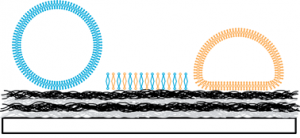Sergio Moya is a soft matter scientist at the CIC biomaGUNE in San Sebastian, Spain. His research focuses on the nano-fabrication of soft matter for various applications including medical applications, to form membranes for water filtration and to study nano-toxicity. Moya is particularly interested in utilising polyelectrolytes as they are “easy to assemble, pattern and synthesise”.
Moya studies polyelectrolyte growth and behaviour using, amongst other things, a quartz crystal micro-balance in tandem with ellipsometry and atomic force microscopy. This allows the growth and assembly of polyelectrolyte multilayers to be monitored along with their mechanical properties and water content (doi: 10.1021/ma1015984).
Polyelectrolyte multilayers have a number of different uses including the non-covalent functionalisation of particles (doi: 10.1021/la803360n). Once coated with polyelectrolytes Moya has shown that the core particles can subsequently be removed without damaging the multilayer coating. The multilayer can also be selectively removed or attached using the appropriate surfactants (doi:10.1021/jp908608u). Polyelectrolyte multilayers have also been used to support lipid bilayer membranes and study their formation (Soft Matter, doi: 10.1039/b805754k). Bilayers, absorbed vesicles and 3D lipid-polyelectrolyte phases have all been seen to form (see figure).
Finally, in a recent Soft Matter paper, not discussed in his talk, Moya has shown that the toxicity of carbon nanotubes can be reduced when coated with polyelectrolyte-lipid layers (Soft Matter, doi: 10.1039/C0SM01511C).
Sergio Moya recently gave a seminar at the Max-Planck Institute for Dynamics and Self-Organization as part of the Dynamics of Complex Fluids seminar series.











